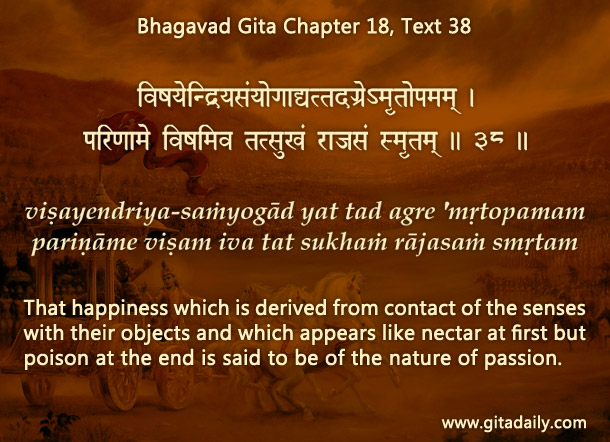Impurity needs to be tackled by focusing on transcendence, not tickled by fantasizing about indulgence. Whenever we have any impurity within us that triggers desires for sensual indulgence, it comes with hopes or dreams of immediate and immense pleasure. Over time, we may realize that such indulgence leads to trouble, as happens, for example, when we eat excessively or indulge impure desires in other ways, getting a little pleasure followed by a lot of trouble. This is underscored in the Bhagavad Gita 18.38, which declares that pleasure tasting like nectar in the beginning will taste like poison in the end.
As we gain an understanding that indulgence leads to trouble or encounter cultural or moral boundaries that limit our physical indulgence, we might try to refrain at a physical level while still indulging mentally by imagining, dreaming, and fantasizing about certain pleasures. Such mental fantasizing is like tickling impurity. Just as tickling gives superficial pleasure, fantasizing about indulgence provides a temporary pleasure. However, that pleasure only strengthens the impurity, leading to greater craving and torment, which can impel us to move from mental indulgence to physical indulgence.
We need to recognize clearly that a different strategy is required for dealing with impurity—we cannot afford to tickle it through mental indulgence. Instead, we need to tackle it. Tackling impurity isn’t about fighting against it forcefully to drive it out of our consciousness; impurity is best tackled by focusing on transcendence and drawing the all-pure divinity, Krishna, into our consciousness until he fills and floods it. As his pure presence spreads through our consciousness and becomes enthroned, the impurity gradually becomes deposed and departs.
The Bhagavad Gita 2.61 points to this dynamic, stating that we need to avoid tickling impurity by restraining our senses and then redirect our consciousness toward the Divine. By employing this two-pronged strategy, we can eventually become free from impurity. While tackling impurity by focusing on transcendence may initially feel demanding—like poison—it leads to an abundant, unending nectar, as promised in the Bhagavad Gita 18.37.
The more we realize that tickling impurity, far from providing easy and harmless pleasure, leads to an expensive and entangling web of impurity, the more we can start tackling impurity. By absorbing ourselves in Krishna, we can march toward purity and increasingly release the richness and fullness of joy that comes from complete absorption in him.
Summary:
- Even when we refrain from physical indulgence in impure pleasures, we may still mentally fantasize about indulgence. Such mental fantasizing aggravates the impurity and impels us toward physical indulgence.
- Rather than tickling impurity, we need to tackle it—not by trying to forcefully drive it out of our consciousness, but by filling our consciousness with Krishna, whose pure presence will displace the impurity.
- The more we realize that tickling impurity may feel pleasant initially but turns out to be like poison eventually, while tackling impurity may feel like poison initially but turns out to be like nectar eventually, the more we can steadily march from impurity toward purity in our inner journey.
Think it over:
- Why do we sometimes choose to tickle impurity, and what’s wrong with it?
- What are the unproductive and productive ways to tackle impurity?
- Contemplate an incident in your life when you tickled impurity and one when you tackled impurity. Reflect on the realizations gained from each experience.
***
18.38 That happiness which is derived from contact of the senses with their objects and which appears like nectar at first but poison at the end is said to be of the nature of passion.



Leave A Comment